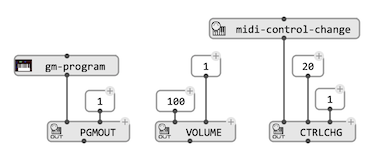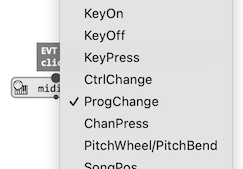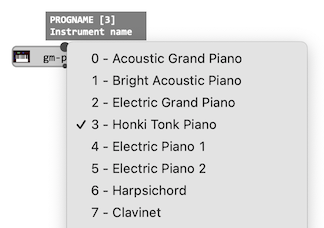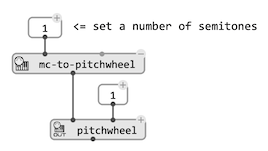OM# Documentation
Sending MIDI
There exist different means to send MIDI messages out from OM#. The main situations are:

- Playing a Score or MIDI object:
CHORD,CHORD-SEQ,VOICE,POLY,MIDIEVENT,MIDI-TRACK… - Sending out through the functions of the “MIDI/Out” package: these functions send MIDI when evaluated (→).
- Assigning an action to other playable structures like BPF (see Continuous Controllers).
All MIDI-out events are sent to a specified port (or to the default MIDI out port if unspecified). See MIDI Settings for details about how to configure and connect MIDI ports to synthesizers.
Note — Microintervals: Setting the pitch bend of some MIDI channels (in particular, using the
pitchwheelfunction) is a means to let MIDI synthesizers render microintervals when playing OM# score objects. See the different options for microtonal tuning in the Preferences / Score tab.
MIDI / General MIDI Standards
MIDI events can be of different types, and the semantics of values is generally unified through a number of layers of the standard protocol (most notably, the “General MIDI” standard).

OM# provides a set of utilities to get these to numeric values required to initialize MIDI events or MIDI sending functions, using input menus:
midi-type: allows to select a MIDI event type identifier

-
midi-control-change: retuns the number corresponding to a given controller (e.g. “Volume”, “Pan”, “PitchBend”, …) suitable to parameterize the first value of a ControlChange event. -
gm-program: returns the program number corresponding to a given instrument timbre, suitable to set the second value of a MIDI event of type “ProgramChange”.

gm-drumnote: returns the pitch (or key number) corresponding to a given drum, suitable to set the first value of a KeyOn/KeyOff event sent on channel 10.mc-to-pitchwheel: returns the value corresponding to a given number of midicents pitch shifting, suitable to set the second value of a “PitchWheel” ControlChange event.

